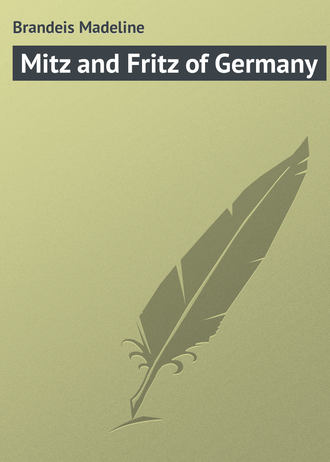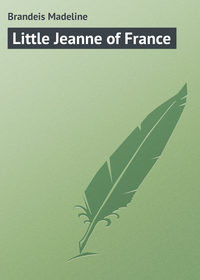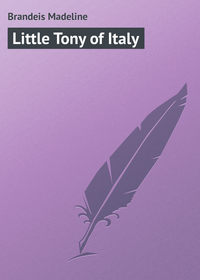 полная версия
полная версияMitz and Fritz of Germany
Mitzi said nothing, but her face was flushed.
"Oh, Mitz!" continued Mrs. Toymaker. "You have cut pieces off your red skirt and tried to sew it together, too. Now it is hanging all wrong. You naughty little girl!"
Fritz was out gathering wood for the fire. Mitzi had worked alone and quickly.
"I do not know what you are up to, Mitzi," said her mother. "But you must be punished for this."
So for three days Mitzi was made to stay in the wagon alone. She could not go with the family to market. She had to eat her meals alone. She had to eat black bread and drink water like a prisoner. This was very hard for sausage-loving Mitz. She was in disgrace.
However, she bore her punishment like a man. She knew that she had done wrong. She helped her mother to arrange the curtains and to fix her skirt. She said nothing. But all the time she knew that soon the brightly colored little cloak would be finished.
CHAPTER XI
EISENACH AND BACH
"Our great chance will come in Leipzig," said Mitzi.
She was sitting on the steps of their wagon, sewing. Fritz sat beside her. He held an open book in his hands.
The Toymakers had made their camp outside of Eisenach (Ī´zĕn-äk). Mr. and Mrs. Toymaker had gone to town, leaving Mitz and Fritz with the wagon. Mitzi wanted to finish that costume before they arrived in Leipzig. Fritz was reading about Johann Sebastian Bach (Bäk), who was born in Eisenach.
"Bach came from a family of musicians," read Fritz. "The name 'Bach' means 'brook.' Beethoven once said, 'He is not a brook but an ocean!'"
"Come," interrupted Mitzi. "Try on the cloak. I am afraid I have made it too large."
"No," said Fritz, as he tried it on. "It fits me perfectly. How pretty it is, and how clever is my Mitz!"
Mitzi waggled her head proudly.
She said, "Many people will be in Leipzig for the fair. When you give your concert, I'll fetch Father and bring him to where you are playing. Oh, how surprised and pleased he'll be!"
Fritz smiled. Then he went on reading from his book while Mitzi sewed.
"'When Bach was a boy,'" read Fritz, "'his father died and he lived with his brother Christoph. One day Christoph brought home a book full of beautiful music. The little boy longed to play it. But Christoph was jealous of Sebastian's talent. He refused to let him have the music book and locked it up.
"'Poor Sebastian wanted very much to play that music. So every night he got up and stole downstairs into the music room. He pulled the book out from between the bars of the bookcase. He sat in the light of the moon and copied the notes.
"'At last, after many weeks, he had copied the whole volume. He went to sleep with his work under his pillow. He was very happy. But next day a terrible thing occurred. While Sebastian was playing the music on the harpsichord, his brother Christoph came in. When Christoph saw what the boy had done, he took away Sebastian's precious copy book.'"
"And what happened then?" asked Mitzi.
She was interested in this poor little fellow who had longed so much for music. She was very angry with the brother.
Fritz read on: "'Sebastian fell ill. He was so unhappy that he could not eat. Then, one day he discovered that he could play the beautiful music without notes. It was all written in his heart!'"
"Ah," said Mitzi. "That is good!"
"'But just as he was playing it,'" continued Fritz, "'in came his brother Christoph again – '"
"The goose!" sniffed Mitzi.
"'Christoph stood in the doorway listening,'" read Fritz. "'At first he was ready to stop the playing. But at last it dawned upon him that his little brother was truly a great artist.'"
"So he stopped being jealous?" asked Mitzi.
"Yes," said Fritz. He closed the book and sighed, adding, "It must have been terrible for Sebastian when his brother took away the music he loved."
Mitzi sighed, too. Then she jumped up quickly, frightening Fritz so that he fell off the steps.
"But now I am hungry," said Mitzi. "Let us go and get some cheese!"
CHAPTER XII
A CASTLE AND THE POET CITY
As the Toymaker family drove away from Eisenach, they passed below the Wartburg (Värt´bo͝ork) Castle. Mrs. Toymaker asked her husband to stop. She wanted the children to see this historic place. The castle stands high on a crag.
As they walked toward it, Mrs. Toymaker said, "It was here that Martin Luther translated the Bible from Latin into German so the German people could read it. There is a tale of how the Devil appeared before Luther, who threw an inkwell at the Devil's head. The spot where that inkwell hit the wall is still to be seen in the castle."
"Please tell us another story about the castle," said Fritz.
"St. Elizabeth was Countess of Wartburg," said Mrs. Toymaker. "She had a heartless husband, who did not want her to be kind to the poor and sick. Upon one occasion he met her going out of the castle carrying a basket.
"'Where are you going? And what have you in that basket?' he asked.
"Now, Elizabeth had loaves of bread in the basket. She was taking them to a poor old woman. But she was afraid of her husband's wrath.
"So she answered, 'I have only roses in the basket.'
"The Count, her husband, looked into the basket to be sure. And, behold, the Countess had spoken truthfully. The loaves of bread had been turned into roses!"
Had Mrs. Toymaker and the children gone into the castle, they would have seen pictures of this story drawn upon the walls. But they did not go inside. They went back to their wagon and proceeded on their way.
"I hope that my friend, Mr. Krauss, will be in Leipzig," said Mr. Toymaker. "Mr. Krauss is a bookseller. He will surely help me. He may even start a toy shop for me in Leipzig. I hope I shall find Mr. Krauss!"
However, before they reached Leipzig, they stopped in Weimar (Vī´mär), the "poet city."
Weimar is where Goethe (Gȗ´tẽ), Germany's greatest poet, once lived. School children were taught to salute the poet Goethe, when they passed him on the street. Today children are still taken to Weimar by their teachers and told about Goethe's life.
Long ago, a little boy was brought to Weimar to visit at the old poet's home. This little boy was about the same age as Fritz and also loved music. Felix Mendelssohn (Mĕn´dĕl-sōn) was his name. Goethe met young Mendelssohn in the garden and led him into the house and to the piano.
He said, "Now, make a little noise for me."
Felix played so beautifully that Goethe said, "You have given me great pleasure. What would you like me to do for you?"
Felix answered, "I should like you to kiss me."
Mitz and Fritz had heard many stories about Felix Mendelssohn. He was their mother's favorite composer.
She had told them how this wonderful boy had written music when he was only a baby. She had told them about the way Felix used to lead a big orchestra. He had been so small that he had had to stand upon a chair.
But Mrs. Toymaker did not know that her own little boy had a gift, too. Sometimes she wondered, of course. Still she agreed with Mr. Toymaker that very few people are born with genius. Only naughty little Mitz was sure because she loved Fritz so much. She loved him and made up her mind that everyone in the world was going to find out about his beautiful music.
As they left Weimar, Mitzi squeezed her brother's hand.
"We are on our way to Leipzig now," she said.
She thought of the costume safely tucked away and ready for Fritz to put on.
Mr. Toymaker was driving the horse, and Mrs. Toymaker sat beside him.
"We are on our way to Leipzig now," said Mr. Toymaker.
He thought of the famous fair to which they were going. He thought of his friend, Mr. Krauss, who would help him. But never once did he think of a concert that was to be given for him.
CHAPTER XIII
THE LEIPZIG FAIR
One of the great fairs of the year was now going on in Leipzig. The Toymakers drove by the railway station, the largest in Europe. Many people were hurrying in and out. They passed the church where Johann Sebastian Bach used to sing.
All manner of peddlers swarmed the streets. The children opened their eyes wide at sight of one man entirely covered by clocks. He was a clock peddler from the Black Forest. Traders from all over the country were in Leipzig with their wares. Buyers from every place were at the fair to buy.
"See, children," said Mrs. Toymaker. "There is a statue of Mendelssohn, the little boy who used to lead an orchestra. When he grew up, he led his orchestra in that building."
Leipzig is a city of books. Everyone seems to be reading. They read even as they stroll along the streets.
Mr. Toymaker immediately set out to find his friend, Mr. Krauss, the bookseller. But he could not find his friend.
The first day at the market place was very dismal. Nobody paid any attention to Mr. Toymaker's wares. There were too many beautiful toys to be seen.
"It is the same here as it was in Nuremberg," said Mrs. Toymaker.
Her sweet face was sad. "Oh, what are we to do?" the poor lady was thinking.
But Mitzi knew what to do. Tomorrow she and Fritz intended to slip away from their booth in the market place. Today their father needed them there to help.
Mr. Toymaker had displayed his prettiest toys: brightly colored soldiers, flaxen-haired dolls, and animals with big, staring-eyes. Yet even children did not stop. At a shop across the square were dolls that talked and walked, engines that sped along tracks, airplanes that flew, and doll houses with electric lights in them and elevators and running water. Is it any wonder that Mr. Toymaker's carved toys did not attract people?
"Run back to the wagon and make some coffee," said Mrs. Toymaker to Mitz and Fritz. "Father and I will stay here a little longer. When we get home we shall have supper."
"But there is nothing to eat in the wagon," said Mitzi.
Mrs. Toymaker looked at her husband. Mr. Toymaker turned to Mitzi.
"Obey your mother," he said. "Go home and make coffee. When we come, we shall bring food with us."
Mitz and Fritz and Frank went slowly back to the wagon.
"I do not understand how Father can bring food," said Mitzi. "There is certainly no money with which to buy it."
"Tomorrow there will be money," smiled Fritz.
"Yes," agreed Mitzi. "Because of your concert. And Father must be there to see." Suddenly she cried, "Oh, careful, you donkey! You are splashing in mud puddles. You are getting your feet all wet!"
But Fritz did not care. He was dreaming. He liked mud puddles because he was a boy. He liked dreams because he was an artist.
When they reached their wagon home, Mitzi put the coffee on the stove. Soon Mr. and Mrs. Toymaker arrived. Their arms were full of bundles.
"See what a nice supper we are to have," said Mrs. Toymaker.
She was smiling, but Mitzi noticed that there were tears in her blue eyes. Mitzi noticed something else besides the tears.
"Mother!" she cried. "Where is your pretty blue necklace?"
Mrs. Toymaker had always worn a string of sparkling blue beads. They were quite valuable and were her only piece of jewelry. She had loved them because Mr. Toymaker had given them to her before Mitz and Fritz were born.
Mrs. Toymaker did not answer Mitzi. She began to untie the bundles.
"See," she said. "Black bread and milk!"
"But, Mother," insisted Mitzi, "where is your necklace? Have you lost it?"
Mrs. Toymaker saw the terror in Mitzi's eyes. That necklace had seemed to the little girl the finest and prettiest in all the world. Her mother was not her mother without it.
Mrs. Toymaker did not know what to say. She drew Mitzi close and kissed her.
But Mr. Toymaker said, "Enough of this, Mitzi. Go and help prepare the supper. You are too curious!"
"But, Father – " began Mitzi.
"Very well, then," said Mr. Toymaker. "I shall tell you. We sold the necklace so that we could buy food. Now, are you satisfied?"
Mr. Toymaker's voice sounded cross. But his face looked very worried.
"Oh, the beautiful necklace!" cried Mitzi.
Mr. Toymaker untied a package.
"Oh, the beautiful cheese!" he sniffed.
He was trying to make the best of things. He was trying to be jolly – poor Mr. Toymaker!
"One cannot grieve about neck decorations," he said, "when the stomach cries out to be decorated!"
CHAPTER XIV
THE CONCERT
Mitzi decided to hold the concert in a park. The market square was too noisy and bustling. She wanted her brother's beautiful music to have a beautiful setting. The two children walked through Mendelssohn Street, Bach Street, Beethoven Street, and Mozart (Mō´tzärt) Street.
"Leipzig is a wonderful city," thought Fritz. "They have named their streets after their musicians."
What would Father think of that? There was no street named after a toy maker!
Bismarck Street was named for a great German leader. The strength and wisdom of Prince Otto von Bismarck helped Germany to become a powerful nation.
In the park many people strolled to and fro. Some were reading. The children came upon a silver pond with beautiful shady trees all about it.
"Now, Fritz," said Mitzi, "you must stand here beside the pond. See how peaceful it is. Your music will float across the water. It will sound like music from heaven."
Fritz put on the homemade Pied Piper cloak. Then he stood beside the pond and began to play. Several people stopped, among them a group of students with books under their arms.
"Is the young musician your brother?" asked one student of Mitzi.
"Yes," answered Mitzi. "And I am his sister."
The youths laughed and gave her a coin.
"Play some Mendelssohn, young one," they said to Fritz.
The boy obligingly played what they requested. The audience grew. Some threw coins and asked Fritz to play certain tunes. He could play nearly everything they called for. Mrs. Toymaker had been a good teacher. Besides, Fritz could play anything after he had heard it once.
Mitzi was very happy. She beamed at the crowd of listeners.
"Now," she thought, "is the time to fetch Father." She whispered to Fritz, "I am going for Father. I shall be back presently. Play until I come."
As Mitzi turned to leave, she bumped into a gentleman who carried a violin case under his arm. Mitzi did not know that this gentleman was an important music master. She hardly looked at him.
She said quickly, "Excuse me, please," and pushed her way out of the crowd. She must go for her father.
The music master stood quite still, listening. What was that he heard? What did he see? A little boy standing beside a pond, playing the violin – a little boy with a smiling face, playing the violin better than any of the music master's grown-up pupils. Who was this little boy? Where had he learned to play like that?
The music master drew closer to Fritz. He asked Fritz to play compositions by Bach and Mozart. He was astonished at how well Fritz played them.
In the meantime Mitzi hurried to her father's booth in the square.
"Father," she cried, "come! Come quickly! I have something to show you."
Mr. Toymaker jumped as if he had been shot.
"What do you mean by startling me like that?" he said to Mitzi. "You are like a young thunderbolt!"
Mitzi's cheeks were glowing. Her eyes danced.
"Fritz is playing – " she began eagerly.
But Mr. Toymaker cut her short. He was in a bad mood. He had sold no toys again today and he could not find his friend, Mr. Krauss. He was jealous, too, of the toyshop keepers who were selling their handsome wares. Now he spent his rage upon little Mitzi.
"Stop!" he cried. "Do not speak again of that boy's silly playing! Go and bring him to me now. You and he shall keep my booth for me. I am going once more to look for Mr. Krauss."
Mitzi's glowing cheeks turned pale. She pulled at her father's sleeve.
"No, no! You must come with me," she pleaded. "Please, Father, close up the booth just for a little while, until we return, and come – "
"Enough!" cried Mr. Toymaker. "Do you tell me what to do or do I tell you what to do? Now, go and fetch that lazy brother of yours. Bring him back here to help you keep my booth for me."
When poor, weeping Mitzi returned to the park, the gentleman with the violin case was still there. He stood very close to Fritz. The boy was playing a minuet. A rather large crowd still remained. Mitzi waited until Fritz finished playing the minuet. Then she went up to him.
"Oh, Fritz," she said, "Father would not come with me. He wants us to go to the market place right away."
Fritz let his violin fall to his side. A look of disappointment passed over his face and covered the smile.
"Do not leave yet," said a voice. "Play some more."
It was the music master speaking. Mitzi wiped a tear with the corner of her apron and looked at the gentleman with the violin case. His expression was kind.
"We must go," she said to him. "But we shall be back again tomorrow."
Mitzi did not know just why she said that. Only quite suddenly she had determined that she would be back tomorrow.
Some one in the crowd called, "One more selection! Come, young one; play!"
A coin came tumbling at Fritz's feet.
"Yes, yes! More music, little fiddler! More music!" cried others.
Mitzi sniffed to drive away her tears. Then she jumped upon a bench. From there she could look down upon the people. And Mitzi Toymaker began to make a speech!
"Ladies and gentlemen," she began.
Fritz thought his sister looked like a little leader. Her head was thrown back. Her two plump legs were wide apart. Her arms were folded. Fritz had to smile.
"I am glad, ladies and gentlemen," Mitzi said, "that you liked my brother's playing. Come back again tomorrow afternoon, and Fritz will give another concert!"
The people clapped their hands and shouted, "Hoch (hōk´)!" which is like "Hurrah."
Then some one called out, "What can you do, little girl?"
Mitzi gave the speaker a quick glance.
"I can do this," she said; whereupon she stood on her head.
There was a loud laugh from the crowd.
"Tomorrow, then!" cried several people.
The crowd began to move away. But the music master hesitated. Should he say something? No, he would return tomorrow. He turned his steps in the direction of home. But he could not forget the wonderful playing he had just heard. Perhaps, after hearing the little musician again tomorrow, he would try to help the youngster.
CHAPTER XV
FRITZ AND HIS VIOLIN
Sadly the brother and sister set off for the market square.
"Never mind, Fritz," said Mitzi. "We will go back to the park tomorrow. The people liked your music. They will come again, and perhaps Father will come and – "
Mitzi broke off suddenly. She stopped in the middle of the street with her mouth open.
"Fritz! Fritz!" she cried. "Oh, Fritzie!"
"What is the matter? What is it?" asked Fritz, puzzled.
He could see nothing to disturb his sister like this. He had not been walking in mud puddles.
"I have thought of the very thing!" said the girl. "I know just what we shall do. Oh, why didn't I think of it before?"
"What is it?" asked her brother.
They began to walk on again, but Mitzi was still in a state of excitement. She clutched Fritz's arm and started to talk. Her words tumbled over on top of one another, they were in such a hurry to come out.
"You shall be a real Pied Piper, Fritz!" she chattered. "Tomorrow I'll make another speech in the park. I'll ask the people to follow you just as the children followed the Pied Piper. While you are playing you will walk away. You'll be like the Piper leading the rats and the children. Only, instead of leading them to a cave, you'll lead them to – "
"Where?" asked Fritz, wide-eyed.
"To Father!" said Mitzi.
"Oh, Mitz!" cried Fritz, horrified.
"Oh, rats!" said the girl. "You'll do as I say. What fun! I know the people will follow. They are such jolly people! And what a splendid way to show Father!"
The sadness had left Mitzi. She beamed. She skipped along and sang, until Fritz caught some of her joy.
They arrived at their father's booth. But the toy maker was not there. He had closed his stand. So the children went home to their wagon. They found their father awaiting them there. The toy maker was twirling his mustache. He had a strange expression on his face.
"Now, Father," said Mitzi, "you can go and look for Mr. Krauss. Fritz and I will watch the booth for you."
But Mr. Toymaker did not move. Instead he smiled in a way which left his eyes unsmiling.
"I have decided not to go," he said. "I have decided to do something else."
"What, Father?" asked Mitzi.
"Tonight," said Mr. Toymaker, "we shall have sausage and sauerkraut and other good things for supper." Then he turned to Fritz, saying, "Give me the violin."
The boy drew away his precious violin. Mitzi stood in front of her brother.
"Father," she asked, "why do you want Fritz's violin?"
"Because I am going to sell it," said Mr. Toymaker. "It is a fine violin. It will bring much money. Besides, it is quite useless to me. Give it here."
But neither child moved. Mitz and Fritz stood like two little statues.
"Do you hear me?" cried Mr. Toymaker. "I want the violin. Give it to me."
Still they did not move. They stood looking up at the toy maker like gingerbread children out of "Hansel and Gretel."
Mr. Toymaker reached out his hand to take the violin from Fritz. But the boy put it behind his back.
"Please, please," he said, "don't take it away from me, Father!"
Now Mr. Toymaker really did not want to hurt Fritz any more than he could help. He loved this little fellow, even if he did think the boy to be only an idle, music-loving scamp.
"Fritz," he said in a kinder tone, "you will soon be a man. You must learn to bear disappointments. Come, now! Give me the violin like a good boy."
As he spoke, the toy maker took the violin from his son's hands. Then he patted Fritz on the head.
"You must learn to help others, Fritz," he said. "You must, above all, help your father."
Fritz longed to cry out and say, "But that is just what I want to do, Father!"
Only he could not speak. His eyes were full of tears, and when he brushed the tears away, the toy maker was gone. So was the boy's beloved violin!
CHAPTER XVI
THE PIED PIPER
The Toymaker family had sausage and sauerkraut and other good things for supper. They ate their supper beside a camp fire near their wagon. That is, Mr. and Mrs. Toymaker did. But Mitz and Fritz could not eat. No, even Mitz could touch nothing – not even sausage!
Mrs. Toymaker tried to comfort them, but it was hopeless. Fritz stared at the ground, and his heart ached. He thought he should never again play his violin. Mitzi sat with Frank's long nose on her lap and stroked the dog's floppy ears.
"Tomorrow," thought Mitzi, "the crowd will come to the park to hear Fritz play, and there will be no Fritz!"
Of course, Mitzi did not know that the music master would come, too. The kind music master would return. He would look for the little boy whose music had pleased him so much. He would wonder what had happened to the clever youngster whom he wanted to help. Mitzi did not know this. If she had known it, she would have been more unhappy than she already was.
The next morning passed much the same as the day before. Mr. Toymaker sold nothing at his booth in the market place.
At noon he said, "There is no use staying here any longer."
He closed up his booth, and they went back to the wagon. After lunch Mr. and Mrs. Toymaker sat upon the steps of their wagon. They talked and talked about what they were to do.
"We could go to some small town and settle down," said Mrs. Toymaker. "When winter comes, a wandering life will not be very pleasant. Mitz and Fritz should go to school. This gypsy life is not the best life for them."
Mr. Toymaker said, "That is quite true. Let us find a town where people are not spoiled by fine toys. There we shall settle and be content to live simply."
"I do wish – " began Mrs. Toymaker.
She had started to talk about Fritz. However, she knew that it made Mr. Toymaker angry. So she stopped.









